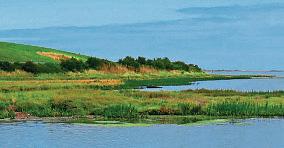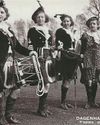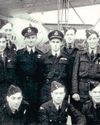
Though I was born 10 years after the end of World War Two, I have an enduring childhood memory of clambering around a disused air raid shelter. It was reached, after negotiating clumps of stinging nettles, in an area we called the dump, near where we lived. Inside, it was pitch black and cavernous, with several underground chambers. My intrepid pals and I would explore without the benefit of a light - not even a match.
These days, it would be securely cordoned off, but not then.
Those memories came flooding back when I took a tour of one of the largest public wartime shelters in the country. I'm not referring to a bunker in a city centre but a network of caves in deepest Kent. Chislehurst Caves (020 8467 3264, chislehurst-caves. co.uk) were quickly (and unofficially) used as a shelter when the bombing of London started in 1940. Soon, people thronged there by the thousands each evening. The caverns grew into an underground city of sorts.
I joined one of the regular guided tours. Our small group was shown bunk beds of the sort used by sheltering families. Areas set up as a chapel, canteen, first aid station, lavatories - even a bank, post office and dentist surgery - were pointed out by our guide, Darren. Most of the vast labyrinth is unlit, so we were handed paraffin-burning hurricane lamps. Their flickering flames cast strange shadows on the walls, some of which are decorated with elaborate carvings.
The caves aren't a natural feature but entirely man-made. Technically, they are mines as they were hacked out of the ground by Romans, Saxons and their successors. Men dug for chalk and flint. During World War One, the space provided a ready-made ammunition depot.
Later, in the 1920s and 30s, the caves housed a mushroom farm and rhubarb grew well, too. I could feel the temperature dropping as we trekked deeper into the void. We could see our breath.
This story is from the November 2024 edition of Best of British.
Start your 7-day Magzter GOLD free trial to access thousands of curated premium stories, and 9,000+ magazines and newspapers.
Already a subscriber ? Sign In
This story is from the November 2024 edition of Best of British.
Start your 7-day Magzter GOLD free trial to access thousands of curated premium stories, and 9,000+ magazines and newspapers.
Already a subscriber? Sign In

Animal Magic
Hilary Middleton recalls a children's author whose tales are still enjoyed today

BACK IN TIME WITH COLIN BAKER
BoB's very own Time Lord prepares for an alternative to panto, recalls his early reading choices and having his scenes cut from two cutting edge comedies

Marvels in Miniature
Claire Saul learns about the exquisite works on display at a new exhibition being held at a historic Georgian mansion

The Last Post
Michael Foley witnessed the end of an era

The Box of Delights
Chris Hallam remembers how his Christmas 40 years ago was lit up by a magical television drama

The Queen of Stage and Screen
Chris Hallam pays tribute to actress Dame Maggie Smith

Other 07
Jonathan Sothcott looks at the seven Sir Roger Moore films that you should have in your collection

In the Best Possible Taste
Derek Lamb remembers the wireless wizardry of Kenny Everett

POSTCARD FROM BUCKINGHAMSHIRE
Bob Barton remembers a ghostly train journey, enjoys some wassailing and fulfils a long-held ambition of attending a lawnmower festival

MERCY MISSION
John Greeves recounts the remarkable exploits of Sunderland flying boat T9114